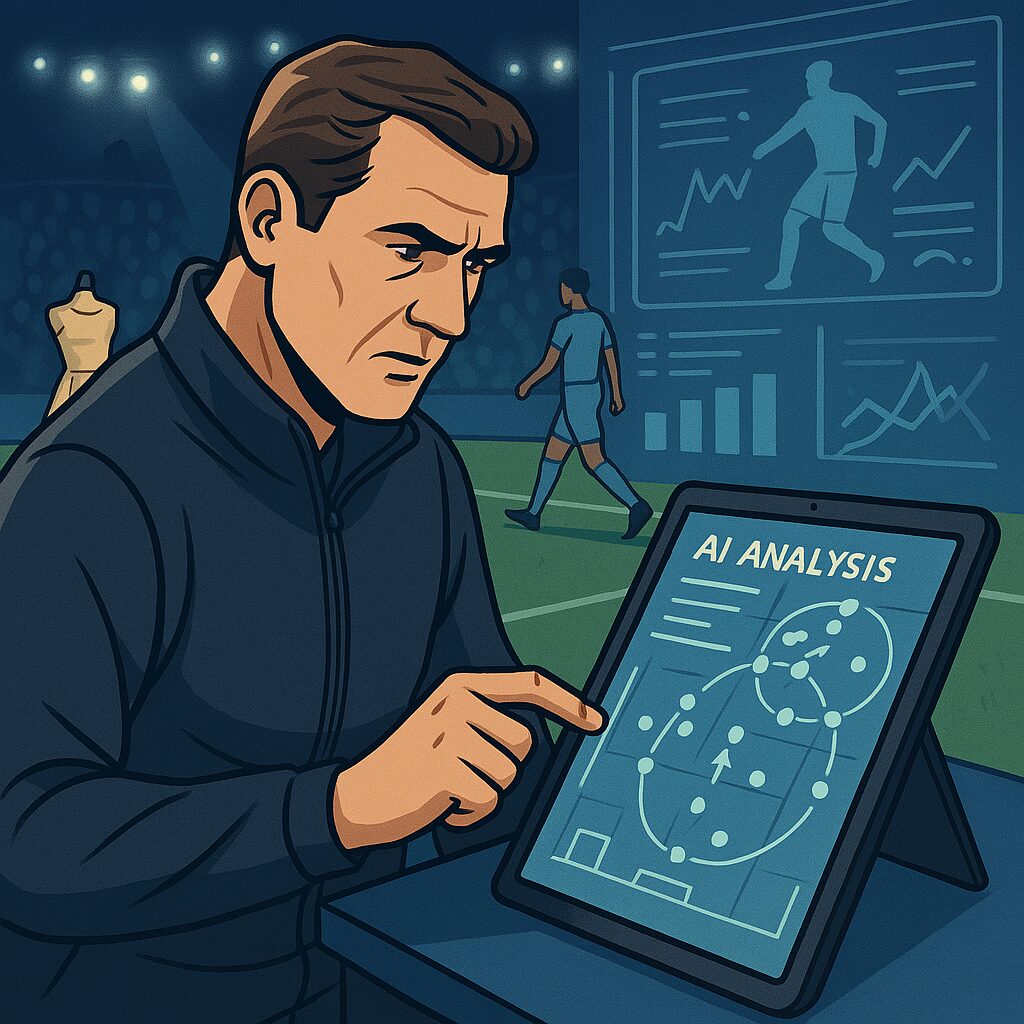Introduction
In the high-stakes world of competitive sports, instinct and experience are no longer enough. Today’s elite coaches are turning to artificial intelligence (AI) to gain a strategic edge. From real-time performance analysis to predictive injury prevention, AI is transforming how teams train, compete, and win.
This article explores the rise of AI in sports coaching, the technologies driving it, and how algorithms are reshaping the future of athletic success.
⚙️ What Is AI in Sports Coaching?
AI in sports refers to the use of machine learning, computer vision, and predictive analytics to enhance coaching decisions. These systems analyze vast datasets—from biometric sensors to game footage—to deliver insights that were previously impossible to obtain.
Key Capabilities:
- 📊 Real-time performance tracking
- 🧠 Predictive injury modeling
- 🎯 Tactical decision optimization
- 🏃 Personalized training regimens
- 📹 Automated video analysis and feedback
🏆 How Coaches Use AI to Win
| Coaching Area | Traditional Method | AI-Enhanced Approach |
|---|---|---|
| 📈 Performance Analysis | Manual video review | Real-time motion tracking & error detection |
| 🩺 Injury Prevention | Physical assessments | Predictive modeling from biometric data |
| 🧬 Training Plans | One-size-fits-all routines | Hyper-personalized regimens via AI |
| 🧠 Game Strategy | Gut instinct and experience | Data-driven simulations and opponent analysis |
| 🔍 Talent Scouting | Visual observation | Machine learning on 800+ data points per match |
AI doesn’t just support coaches—it augments their intuition with precision.
🧪 Real-World Examples
- ⚽ Manchester City uses machine learning to scout players, analyzing over 800 metrics per match
- 🤸 Fujitsu’s Judging Support System detects micro-errors in gymnastics routines invisible to the human eye
- 🏀 An NBA team reduced ACL injuries by 41% using AI-based injury prediction models
These aren’t just enhancements—they’re game-changers.
🧠 The Tech Behind the Transformation
AI sports systems rely on:
- Computer Vision: Tracks joint angles, posture, and movement in 3D
- Machine Learning: Learns from historical data to predict outcomes
- Biometric Sensors: Monitor heart rate, oxygen efficiency, and fatigue
- Digital Twins: Simulate athlete physiology for training optimization
Together, these tools create a feedback loop that evolves with every game and every athlete.
⚖️ Ethical and Strategic Considerations
While AI offers immense benefits, it also raises questions:
- 🧑⚖️ Who owns the data—teams, athletes, or tech providers?
- 🧠 Can algorithms account for emotional and psychological factors?
- 🧍♂️ Will AI reduce the role of human intuition in coaching?
Coaches must balance innovation with empathy, ensuring technology serves—not replaces—the human spirit of sport.
🔮 The Future of AI in Sports
- 🧠 Emotion-aware coaching systems
- 🏟️ AI-powered fan engagement and broadcasting
- 🧬 Genetic and biomechanical modeling for talent development
- 🛠️ Real-time tactical adjustments during live games
AI is not just a tool—it’s becoming a teammate.
🌐 SEO Optimization Summary
✅ Meta Title: “AI in Sports: How Coaches Use Algorithms to Win in 2025” ✅ Meta Description: “Discover how AI is revolutionizing sports coaching. Learn how algorithms help coaches optimize performance, prevent injuries, and win more games.” ✅ Keywords: AI in sports, sports coaching technology, machine learning in athletics, predictive injury prevention, AI performance analysis, digital twins in sports ✅ Formatting Tips:
- Use structured headings (H1–H3)
- Include tables and bullet points for readability
- Embed alt text in visuals (e.g., “AI analyzing soccer player’s movement”)
- Keep paragraphs concise and keyword-rich
Conclusion
AI is rewriting the playbook. Coaches who embrace algorithms aren’t just keeping up—they’re pulling ahead. As data becomes the new currency of competition, the smartest teams will be those that learn, adapt, and evolve faster than ever before.
The future of sports isn’t just physical—it’s computational.
Would you like a visual to accompany this piece—perhaps an AI dashboard analyzing a live match, or a coach reviewing predictive injury data on a tablet? I can also adapt this into a podcast script or infographic.

